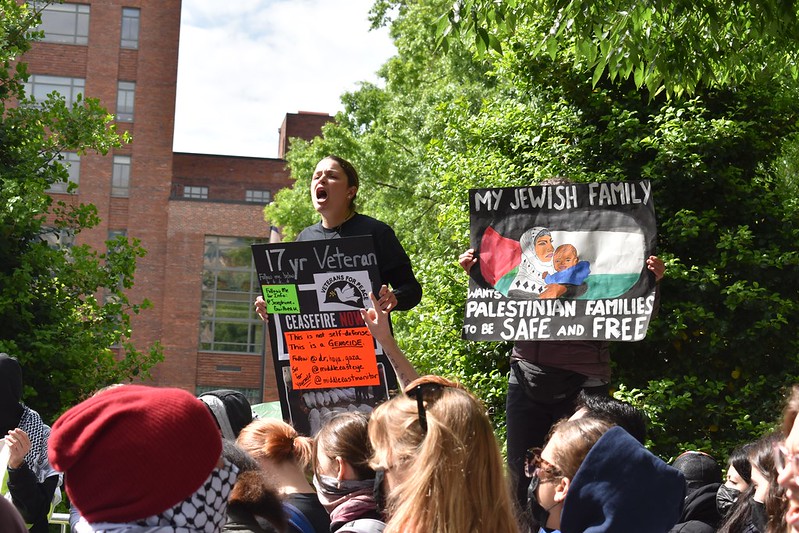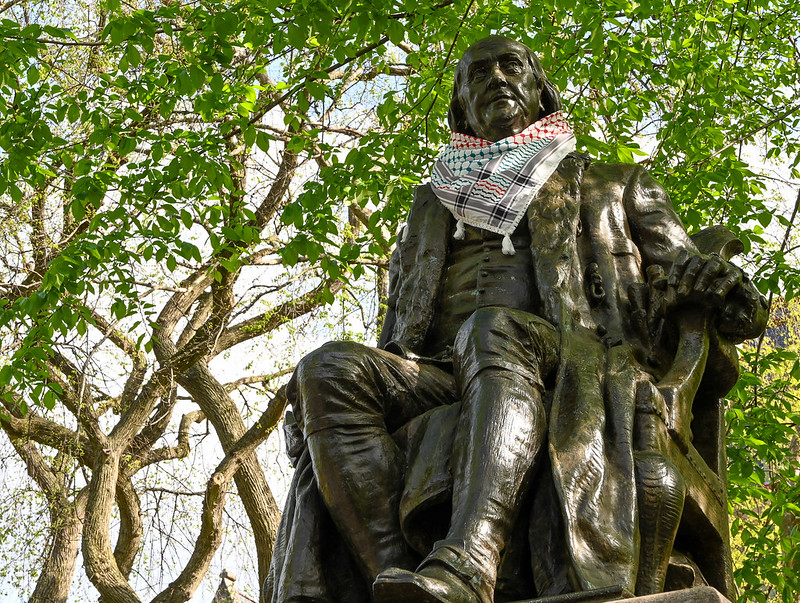“We are here to bring attention to what is happening in Gaza, where the most horrendous human rights violations are unfolding in front of our eyes.” These words from a Yale University law student epitomise the sense of purpose that characterises the protests sweeping across American universities. Since mid-April on over 40 campuses, students have set up encampments, pickets, and rallies as part of a mass movement in opposition to the Biden administration’s support for Israel’s war of aggression on Gaza.
The recent upsurge began with protests at Columbia University in New York and quickly spread to other prominent universities, including Harvard, Yale, Michigan, Berkley, California, and lesser-known higher education institutions such as Emerson College in Boston, Emory College in Atlanta, and California Poly University in Humboldt, where students’ occupation of the administration building has forced the closure of the campus until 10 May, the day before the graduation ceremonies.
The arrests of 101 students at Columbia on 18 April rather than quelling the protest fuelled even more support for the encampment from students and faculty. As in May 1970, following the killing of four students at an anti-war rally at Kent State, over a million students walked out of class and many universities were closed as a result of the mass student protests, the repressive tactics deployed at Columbia sparked similar encampments at universities and colleges across the country.
The decision to call in the police by Columbia’s President Minouche Shafik was not the first attempt to quash dissent on the role of the United States in the war on Gaza. In November 2023, the university administration prohibited Jewish Voice for Peace and Students for Justice for Palestine from holding any campus meetings or rallies. In response, a candle-lit procession and a walkout by some lecturers followed. The students, rather than being cowed by the university’s action, stepped up their organising. Columbia for Apartheid Divest—a broad coalition of 40 student groups bringing together students from various racial, ethnic, and religious backgrounds—was created to pressure Columbia to divest from companies that supported the Apartheid state of Israel.
The student movement in solidarity with Palestine has become a national political battleground. Republicans in Congress have seen it as an opportunity to attack liberal higher education institutions, which they view as incubators for dangerous radical ideas, and exploit the growing divisions within the Democratic Party over the war on Gaza. At recent hearings held by the House of Representatives Committee on Education and the Workforce, the Columbia University President came under attack by the Committee Chairwoman, Elise Stefanik, for failing to ‘ensure a safe learning environment’ in the face of pro-Palestinian demonstrations. The Republican Speaker of the House, Richard Johnston, called the mounting university protestors as engaging in ‘mob-rule’ and others have charged student protestors with blatant anti-Semitism.

Photo by Allison Fletcher Acosta
Moreover, the student movement poses a threat to Biden’s re-election bid, as the Democrats’ argument about ‘saving democracy’ against an ‘authoritarian’ Trump Presidency is undermined by Biden’s silence about the violent police tactics used against peaceful student protestors.

Hundreds of Temple, Drexel and UPenn students marched in solidarity with Palestine to UPenn’s campus on April 25, where professors walked out of classes. Students also set up tents in solidarity with the Columbia University student encampment. Image by Joe Piette.
Nevertheless, with the growing visibility of Jewish students in the movement, the attempts to weaponise anti-Semitism have failed to dent its vitality or threaten its legitimacy. One Columbia student firmly declared, ‘We are here to stand in solidarity with Palestine, and we refuse—our Jewish membership refuses—to equate that with antisemitism’. Neither have the hundreds of arrests and suspensions of student participants stemmed the movement’s growth. At Northeastern College in Boston, one arrested student defiantly reasserted the demand: ‘We want them to divest our money that we’re paying for tuition in firms that support Israel’, Another suspended Cornell University student confidently held that the university was taking punitive measures because it ‘truly fears the movement may succeed’.
How can we explain the emergence and timing of the recent university protests? Access to social media has allowed many to develop a counter-narrative to the prevailing one pedalled by US Democratic and Republican leaders. Months of exposure to the images of the misery and privation suffered by the Palestinian people have resulted in a swing in public opinion, as expressed by polls that show a plurality of respondents disapproving of Israel’s conduct of the war and the Biden administration’s political and military support for Israel. Among Americans under the age of 30, this opposition is even more pronounced.
Even during the early days of the war, opposition was mobilised. A national demonstration in Washington DC, in November drew a record number of participants. A network of local student groups, under the umbrella of the National Students for Justice in Palestine, continued to mount a steady campaign against the complicity of the universities in the war on Gaza. Moreover, students and young people were at the forefront of sit-ins in the rotunda of the Congressional building. They also blocked the major bridges in New York City and San Francisco and occupied the central railway station in Chicago.
In short, these militant direct action tactics generated greater publicity and visibility on the issue of the US government’s support for Israel’s war on Gaza. The university and college encampments, even when they come to an end, have become the latest chapter in the growth of the solidarity movement with the Palestinian people.
Main Image by Joe Piette
Art (53) Book Review (121) Books (114) Capitalism (65) China (79) Climate Emergency (97) Conservative Government (90) Conservative Party (45) COVID-19 (44) Economics (39) EcoSocialism (55) Elections (83) Europe (45) Fascism (56) Film (49) Film Review (68) France (69) Gaza (59) Imperialism (97) Israel (119) Italy (45) Keir Starmer (52) Labour Party (110) Long Read (42) Marxism (47) Palestine (163) pandemic (78) Protest (149) Russia (335) Solidarity (134) Statement (48) Trade Unionism (134) Ukraine (340) United States of America (130) War (363)

